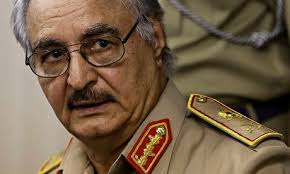 “After a continuous struggle against terrorism and its agents that lasted for more than three years… we announce to you the liberation of Benghazi from terrorism,” Field Marshall Khalifa Haftar of the Libyan National Army (LNA) stated in a TV broadcasted message.
“After a continuous struggle against terrorism and its agents that lasted for more than three years… we announce to you the liberation of Benghazi from terrorism,” Field Marshall Khalifa Haftar of the Libyan National Army (LNA) stated in a TV broadcasted message.
Although the city “enters a new era of peace, security, reconciliation… and, reconstruction” as of Wednesday, he hinted that it is still not safe as they continue to clear it of mines and bombs.
LNA under the command of Haftar launched Operation Dignity in 2014 with the objective of taking over the city controlled by the Revolutionary Shura Council of Benghazi, an alliance of Islamist militias among them suspected members of the Islamic State group and the Al-Qaeda linked Ansar al-Sharia.
The operation has been very fatal over the years. Last week a medical source in the city said 44 LNA soldiers had been killed in June alone in Al-Sabri and Soug al-Hout; the last neighborhoods of the city controlled by extremist militants.
Haftar remembered those who have fallen along the road as he paid homage to “a caravan of martyrs” during the long operation.
Benghazi’s fall to the LNA will be a boost to the Tobruk-based House of Representatives (HoR) as it increases its scope of influence amid the standoff with the UN-backed Government of National Accord (GNA).
Foreign Minister Mohamed al-Taher Siala of the GNA, in May, urged Haftar to reconsider his position by accepting to “work under a civilian authority and officially endorse the political deal” that the HoR has been reluctant to approve.
LNA’s major obstacle could be imposing its authority in Benghazi. The eastern city has a history of uprising since the colonial days when Italy governed the North African country and it was also the turning point in the uprising against the Gaddafi regime.